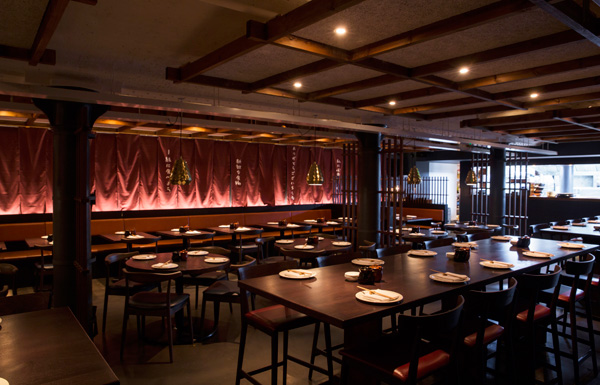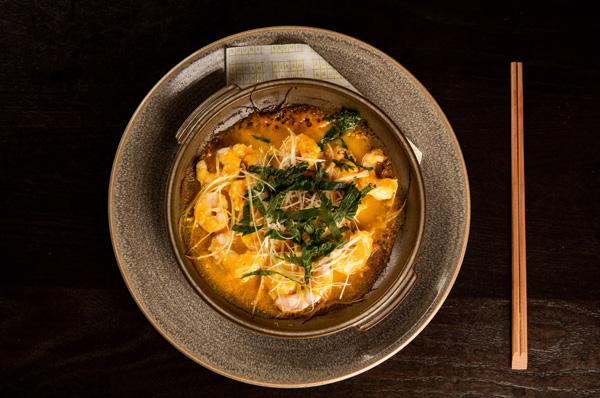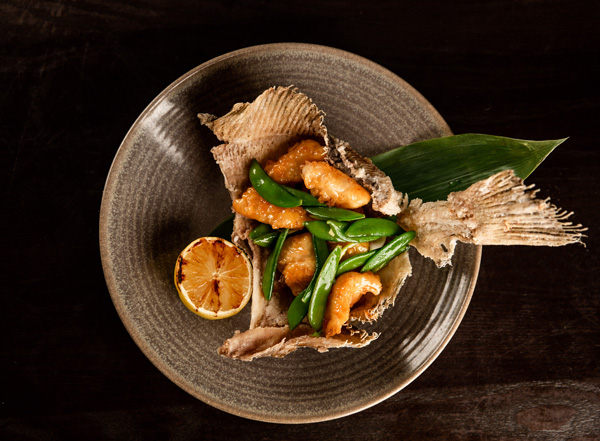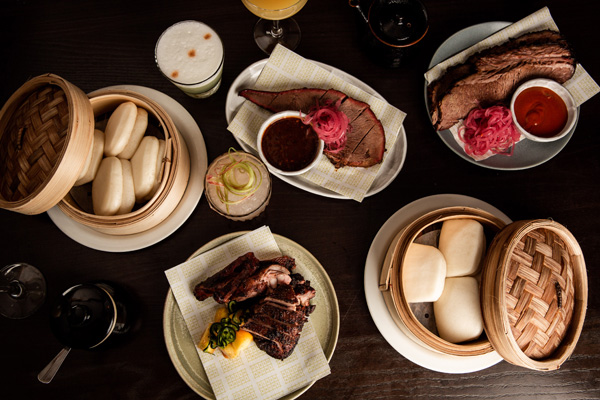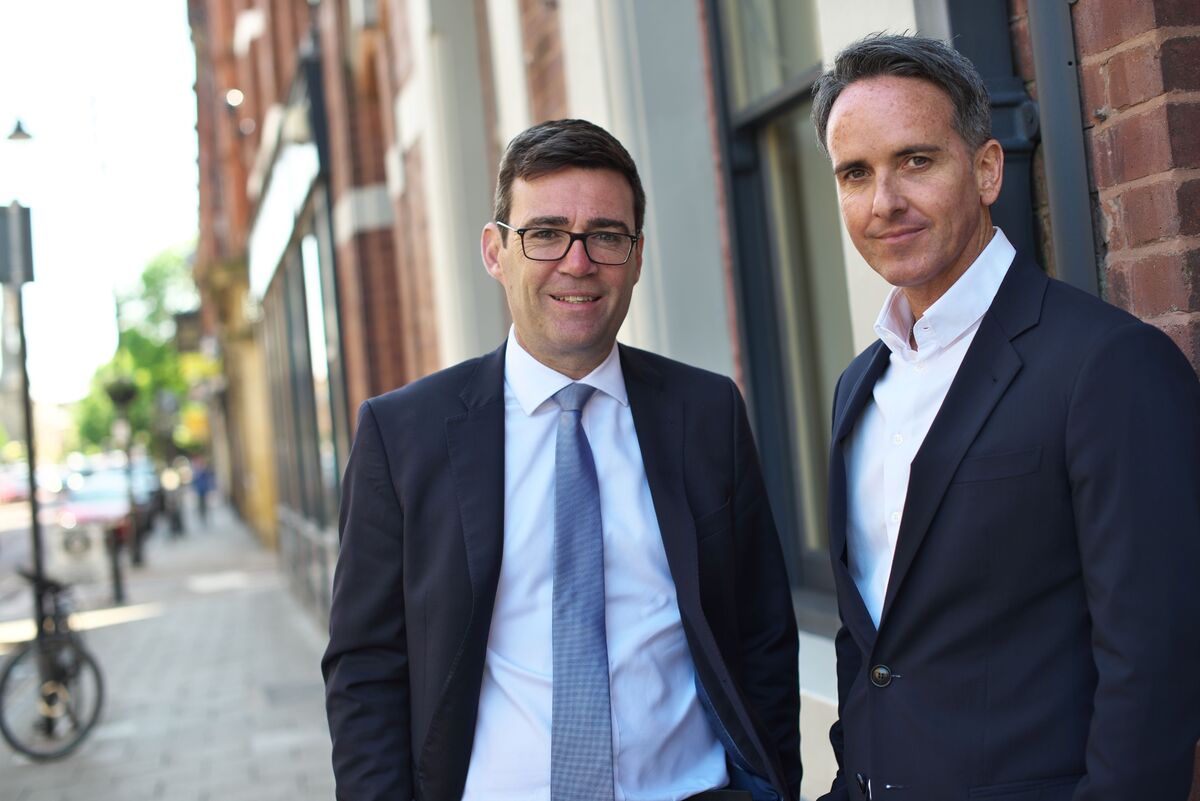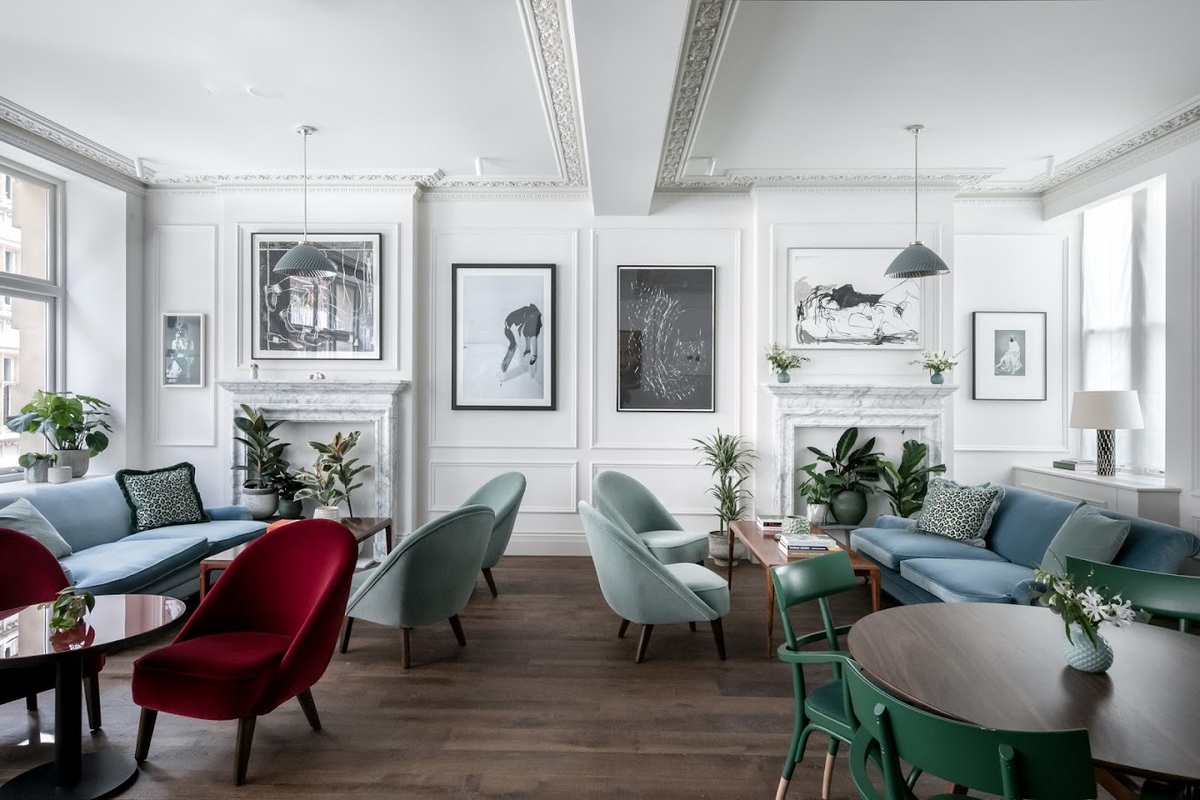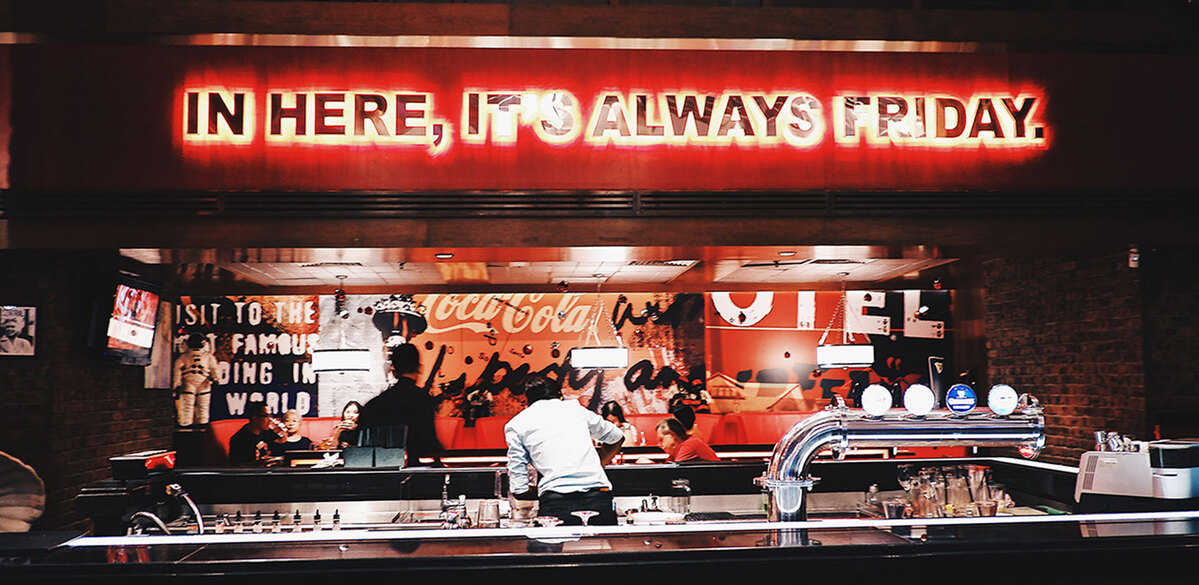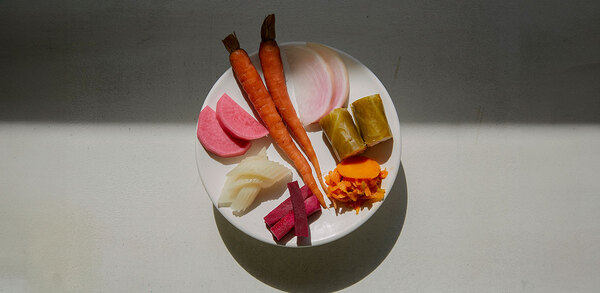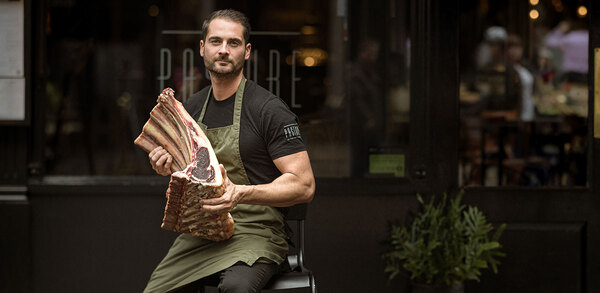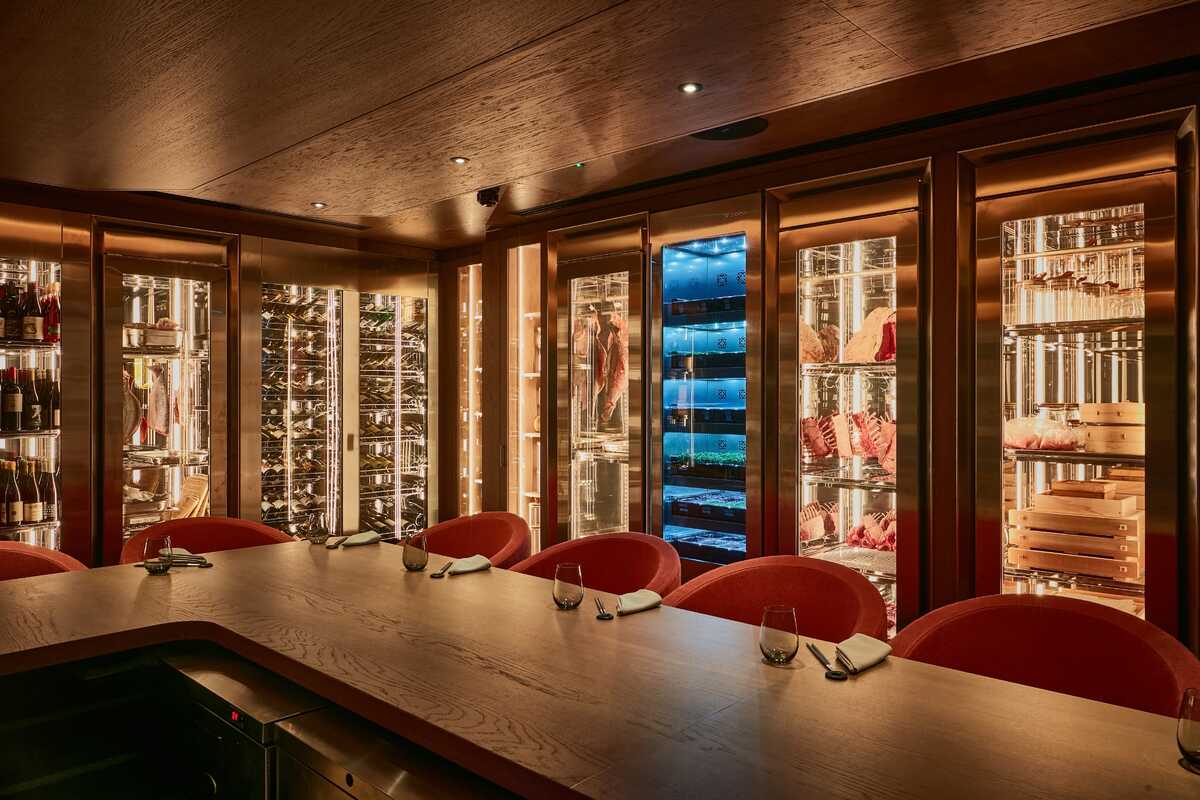Bone Daddies' Ross Shonhan: ‘We're not trying to be cool, we're just trying to have fun'
Nobu-trained chef and restaurateur Ross Shonhan is behind successful Japanese-inspired restaurants Bone Daddies, Shack-Fuyu and Flesh & Buns, and he's expanding into Fitzrovia. Emma Lake talks to him about Nikkei cuisine and push-button pisco sours
It's been five years since you opened the first Flesh & Buns. What made you decide to open another now?
When I opened this [Flesh & Buns in Covent Garden], it took a lot out of me. It was only nine months after we opened the original Bone Daddies and I didn't have a support team at that stage, so it was a lot of work. I said then that I would never do another one. I think over the past five years my wounds have healed and my memory has maybe eroded some pain but, more importantly, I've got a team who will work alongside me to help deliver these things, which makes the prospect realistic.
We revamped the Covent Garden Flesh & Buns last year. We divorced it from Bone Daddies from a branding point of view, pitching it as a slightly more premium offer, but still with a slightly silly name. Then we thought, we've separated it from Bone Daddies, it has its own strong identity, so let's do a new one.
Then this big site in Fitzrovia was shown to us and we thought we could make it a flagship Flesh & Buns. Covent Garden had to take the fabric of the building as it was and initially we just slapped some paint around and opened. I always thought that the dining room, although it was fun when it was full, never lived up to the quality of the offering and the service.
What's the new site like?
It's a concrete box. It's all on the ground floor, 1,500 sq ft, in Berners Street, which is historically renowned for the Sanderson and Berners Tavern. We're going to have a big open kitchen, which will have seating all around it, a decent-sized bar, and a private dining room that will seat about 18.
It's got big windows and a lot of natural light. We'll reference some of the elements of this place, like some of the timber divides, but we will have a little more colour, some Peruvian fabrics, a bit more gold and some greens and blues. We'll try to break the space up a bit because it's quite big.
What helped was all the other restaurants that have since jumped on the bao bandwagon, so Wagamama, YO! Sushi and Giraffe. Buns are now very much part of the London food scene, from street food all the way up. It has helped educate an audience for us.
How are you planning to evolve the offering?
We will push the menu in a slightly different direction. I didnât want to alienate this customer base completely, but I do want them to have a different experience. None of our ramen bars are identical and we arguably like making life hard for ourselves by trying to make each one unique.
For this one I wanted to explore Nikkei cuisine; more Peruvian Japanese. I went out to Peru last year â" it had been on my list for a long time and I was fascinated by what I saw. The chef whoâs going to open the restaurant, whoâs worked with me for several years, is out there now. We just thought, letâs have a lot of fun. Weâre going to do a lot more ceviches and tiraditos on a raw fish counter. At the other end will be the pastry section, so weâll come â¨up with some fun pastry things that Iâve got a few ideas for and then one of the big pieces of kit Iâm excited to have fun with is a big smoker. Weâll rub short ribs and briskets and things in this chilli miso rub that we make and then smoke them overnight.
Japanâs renowned for technology and what YO! Sushi did, bringing technology from Japan into its restaurants, was clever. So weâre going to import a little bit of that, but in a fun way. We thought, letâs put buttons on the table, so weâre going to do a âpush for piscoâ button. Weâre having trollies made where the barman can come and makes cocktails tableside â" not with a five-star hotel, stuffy feel, but in a social, casual environment. I just want it to be fun. I just want people to leave drunk, full and happy.
Weâve seen challenging times for the restaurant sector in recent months and itâs a large, 170-cover site â" are you feeling confident?
Every single restaurant opening, no matter who you are and what you know, is still ultimately a gamble. Thereâs no science to it and no recipe for success. Almost every restaurateur I know who is successful has also had failures along the way. I just hope this isnât ours. Thereâs a lot of luck involved and you hope youâll appeal to your audience and that youâve got something they want. Then all you can do is work hard to get the team to deliver. Thatâs always the hard part.
Weâll have about 50 people in the team, maybe a few more. You have to take all of those vastly different backgrounds and ideas and understandings of the industry and get them pushing in the same direction. Thatâs a challenge and it takes a couple of months generally for restaurants to hit their stride.
yuzu, honey and rocoto pepper sauce
Thereâs no question weâre in ridiculously tough times. On every level I feel like weâre under attack as a small business and an industry. People ask what your strategy is and, in very simple terms, itâs to be here in two yearsâ time. We donât have any bold expansion plans â" we never have had bold expansion plans â" we have just tried to have considered growth.
How do you give yourselves the best chance in these challenging times?
We look critically at ourselves and, when Fitzrovia is open, weâre going to take the opportunity to re-engage with our team and customers, hopefully in a way that builds stability.
When we look back, weâve evolved a hell of a lot. Our ramen bars have evolved too over the years â" not just the ramen itself, but the things we offer alongside it. We introduced poke at the back end of last year to encourage that summer offer, and we were already making an amazing curry base so a natural evolution was to do katsu curry in our ramen bars, and we make it from scratch.
Iâm a perfectionist and a control freak and if I look critically at our delivery I donât necessarily think itâs good enough. A lot of people wouldnât know that â" thatâs me, not my customers. But we must stay in front of our customersâ perceptions.
How important is it that your menu is seen to be authentic?
An honest level of quality is important to me â" I donât want to be associated with serving shit. We could buy everything cheaper, but we donât. The nori we use on our sushi is from a guy just outside Hiroshima, whose family has been making nori for 100 years. I hope that separates us from a customerâs point of view: for those that know, and for those that donât. We can hold our heads up because of these decisions. We try to buy quality, intelligent ingredients of which we can be proud.
People still have this very blinkered, one-dimensional approach of what is happening in Japan, and just like every country it has social media, its people are travelling all over the world and theyâre taking foods from around the world back to Japan. Italian and French food are two of the most popular cuisines in Japan after Japanese. Weâre more reflective of whatâs happening now â" thereâs a reference to all of it.
In Shack-Fuyu and even at Flesh & Buns at times there are a lot of Mexican influences. In Gifu, which is not a major tourist town, I was taken to this Mexican restaurant belonging to this Japanese guy who had been surfing in Mexico, fell in love with Mexican food, took it back to Japan and was doing a collision of Mexican and Japanese food. The fact Iâve cooked in Japanese restaurants for a long time and lived in Texas just made sense â" there are references for where all this is happening.
Bone Daddies and Flesh & Buns are meat-centric concepts. At a time when veganism, vegetarianism and flexitarianism are on the rise, are you feeling pressure to adapt?
The media perpetuates this more than what we see on the ground. However, when we opened Bone Daddies, I thought there would be no chance we would get vegetarians to even walk through the door.
About a year after weâd been open, we just realised that it wasnât so much that vegetarians or vegans were coming to our restaurant specifically, but they were coming with their friends. If youâve got a group of four people, one of them will regularly be a vegetarian or vegan. So we set ourselves a challenge to come up with a meatless ramen. We thought, âitâs still going to have to be meaty, but how can we do that without meat?â We started the process and weâve had a mushroom ramen on the menu for five years and weâve continued to add other vegetarian and vegan options.
What is it about hospitality that excites you?
The challenge of this industry excites me. I wouldnât want to do anything else. Itâs a sick business, hospitality. You get to see the instant results of your efforts and making people happy with food and drink excites me. I still love cooking, although I donât get very much time in our kitchens now.
I have lots of ideas for lots of different restaurants. I would like to go beyond Japanese food, but itâs time and itâs hard. I see why people take the cookie-cutter approach and bash these things out.
Youâre an ex-Nobu and Zuma chef â" would you ever want to open a high-end restaurant?
One day, I do want to compete at that level again. Thereâs a masochist in me, wanting to work through that pain of doing something high-end.
About Ross Shonhan
Ross Shonhan was born and raised on a cattle farm in Queensland, Australia.
He had six yearsâ experience as a chef when he moved to London to take up positions at Asia de Cuba and the Dorchester. In 2005 he was recruited by the Nobu group and appointed head chef for the opening of Nobu Dallas, receiving training from Nobu Matsuhisa. In 2007 Shonhan returned to London to take up the role of head chef of Zuma in Knightsbridge.
In 2012 he set out alone, opening the first Bone Daddies ramen bar in Sohoâs Peter Street. Flesh & Buns Covent Garden followed, specialising in bao in 2013, with Shack-Fuyu opening in 2015.
The group has grown to incorporate six Bone Daddies restaurants, with the second Flesh & Buns set to open on 21 September at 32 Berners Street, London.
On the menu at Flesh & Buns Fitzrovia
⢠Shellfish ceviche featuring whelks and cockles
â¢Â Plaice tiradito with truffle ponzu and yuzu tobiko
â¢Â Chilli-miso smoked brisket with chipotle miso barbecue sauce and pickled red chillies
â¢Â Shichimi and sansho pepper jerk duck with coal-roasted peach chutney
â¢Â Tempura plaice with yuzu, honey and rocoto pepper sauce
â¢Â Katsu rabbit leg with apple and fennel slaw and curry mayonnaise
â¢Â Prawn toban yaki with aji amarillo garlic butter



